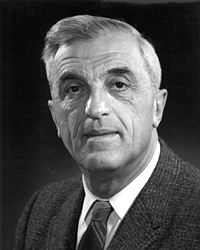
Back فليكس بلوخ Arabic فليكس بلوخ ARZ Feliks Blox Azerbaijani فلیکس بلوخ AZB Фелікс Блох Byelorussian Феликс Блох Bulgarian ফেলিক্স ব্লখ Bengali/Bangla Felix Bloch BS Felix Bloch Catalan فلیکس بلۆخ CKB
Felix Bloch | |
|---|---|
 Bloch in 1961 | |
| Born | 23 October 1905 Zürich, Switzerland |
| Died | 10 September 1983 (aged 77) Zürich, Switzerland |
| Nationality | Swiss |
| Citizenship |
|
| Alma mater | |
| Known for |
|
| Awards |
|
| Scientific career | |
| Fields | Physics |
| Institutions | |
| Doctoral advisor | Werner Heisenberg |
| Doctoral students | Carson D. Jeffries |
Felix Bloch (/blɒk/; German: [blɔx]; 23 October 1905 – 10 September 1983) was a Swiss-American physicist and Nobel physics laureate who worked mainly in the U.S.[1] He and Edward Mills Purcell were awarded the 1952 Nobel Prize for Physics for "their development of new ways and methods for nuclear magnetic precision measurements."[2] In 1954–1955, he served for one year as the first director-general of CERN. Felix Bloch made fundamental theoretical contributions to the understanding of ferromagnetism and electron behavior in crystal lattices. He is also considered one of the developers of nuclear magnetic resonance.
- ^ Hofstadter, Robert (March 1984). "Obituary: Felix Bloch". Physics Today. 37 (3): 115–116. Bibcode:1984PhT....37c.115H. doi:10.1063/1.2916128. Archived from the original on 30 September 2013.
- ^ Sohlman, M (Ed.) Nobel Foundation directory 2003. Vastervik, Sweden: AB CO Ekblad; 2003.